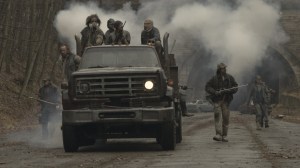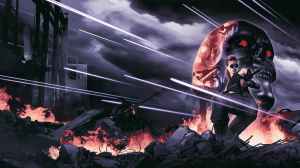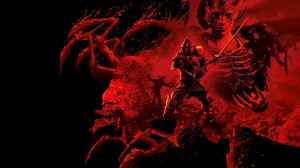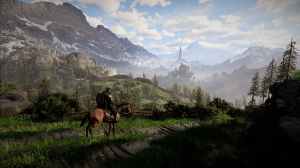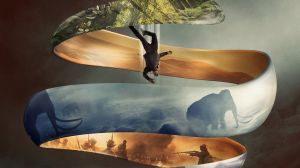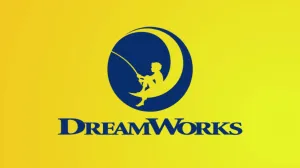
Daz Crawford play Kebo in Marvel’s Agents of S.H.I.E.L.D., the strong right hand of new Hydra head Grant Ward. That puts his character in the interesting position of being a member of the old guard whose near the top of the chain of command in the new era.
Videos by ComicBook.com
But that’s not all for Crawford. He’s played parts in films like Blade II, provided the motion capture Kratos in God of War, pretended to be a cat for the upcoming Jungle Book, and has several new films queuing up for release.
Crawford took some time to talk to use about Agents of S.H.I.E.L.D. and the other projects he’s been lending his talents to.
So how many time have you had to say “hail Hydra” since coming on with Marvel’s Agents of S.H.I.E.L.D.?
DC: [Laughs] I think I’ve only ever done it in a mumble. Actually, let me think…The first time, when the other guys did it, I was semi-unconscious, so I kind of missed out. It’s not the sort of thing a second in command has to do. I’m not that rank that I would have to do that.
We haven’t gotten to learn too much about Kebo yet. What can you tell me about the character, or at least your undemanding of the character so far?
DC: A lot of times, we have to make history up if it’s not in the script. When I always see the script, when I read it as Kebo, I go back in my head. “Why am I here? What do I want? What’s going to happen if I get it? What’s going to happen if I don’t get it?” And I answer those questions.
I’ve got my own agenda, with regards to Ward. I don’t think he’s even told Ward, because it’s like, if you’re at work and you want a promotion, do you tell your competition that you want a promotion? There’s just certain things that I would keep to myself.
With regards to Kebo, having had experience with the old Hydra, it’s a bit like having a new boss. It’s exactly that. You’ve got a new boss. A new boss comes in, and 99 percent of the time bosses want change. They want to do it their way. At the moment, I – as Kebo – am just getting on with it, and I’m not telling anybody – I’m not even telling Ward – how I feel about all of it. I know what I want, and I’ve just got to keep that to myself and wait for the right moment.

So Kebo views Ward as competition? Does that mean he’s not entirely loyal?
DC: At this stage in the game, Kebo is definitely loyal. He hasn’t done anything that would warrant distrust, so at this stage of the game, yeah, I would say I’m a loyal subject to the boss. Where that goes, nobody knows.
In the most recent episode, we got our first real conflict between Ward’s new Hydra and his old friends at S.H.I.E.L.D. With that in mind, looking across at the other team, who would you most like to mix it up with in a good fight scene?
DC: I’d like to have a fight with Lash [laughs]. I like a good fight. I don’t want an easy fight, and I wouldn’t want to get into the ring with somebody I know I’m going to beat. I want to get into the ring with somebody I know I’m going to have a good competition with, whose ready for me.
The type of person I am, I was a boxer, an Olympic boxer, so I’d fight anybody. I don’t particularly care if they’ve got superpowers or not. But Lash would definitely be some competition, he’s got something going for him.
I like that you aim high. “Give me the biggest person in the room.”
DC: [Laughs] Well I’m not going to go for someone little. How would you do that? That’s the easy way out. No, that’s not me. That’s not me

This isn’t your first time being a part of the Marvel Universe, or at least part of a Marvel Universe. You also played Lighthammer in Blade II. How has your experience on S.H.I.E.L.D. compared to your previous Marvel role?
DC: It was different in regards to it was a movie. You shoot for three months and it’s all over. It’s quite intense, and you get all the information in one go. Whereas, when we’re shooting this, it’s just in increments. We get bits here. We don’t know what’s going to happen until we turn the page when we go for the readings every week. So you’re kind of in the dark, in that respect. It’s not in a bad way. It’s quite exciting when you don’t know. IN that respect it’s different.
Character wise, because you don’t know what’s going to happen. You’re trying to develop and arc for your character, and then you turn the page over and, ugh, “I can’t do that now” because it’s there, whatever’s been written. So you’re adjusting, as you go along, to the material that you’re being given. It’s very different because its ongoing. In a movie, there’s a beginning, middle and an end. In this, there’s no end, it’s just going on and on.
How does Kebo feel about Ward’s eccentricities as concerns S.H.I.E.L.D. and Hydra, with Ward wanting to be called “director” and giving his bases S.H.I.E.L.D.-like names? Is he onboard with that, or is he looking at Ward and thinking, “This guy is a little unhinged”?
DC: [Laughs] Like I said, it’s like you get a new boss, they come in, they want to make changes. You’ve been around a while and you know the changes, the things they want, stem from somewhere else. It’s one of those things where you’ve got to bite your tongue. You can’t say anything. You can’t say, “Well, I’ve had experience in this, and that’s not going to work,” because he’s just going to get pissed off with me, isn’t he? It’s one of those things where you just have to bite your tongue and don’t say anything, and then I have to say myself, “Well, okay.” It’s almost like when you say to a child, “Don’t do that,” and then they’re going to do it. “Don’t open the door.” What do you want to do? So, for me, I feel like I’m being held. I’m not in the position to make waves right now.
So it’s kind of like “Sure boss. You want to be called Director? I’ll call you director. Whatever you say.”
DC: Yeah, the boss is director? You’re the director, and I’ve just got to go along with it. I’m just not in the position to change anything.
A couple of episodes ago we were introduced to Werner Von Strucker, and he got in a bit of a sucker punch on you. Do you think Kebo’s waiting to return that favor?
DC: Yeah, he did give me a good – yeah, that little s**t [laughs]. Yeah, that did surprise me. I think, as Daz and not Kebo, I’d love to get revenge. I’d love to. Whether that will happen, I don’t know. It’s just kind of funny with that episode, I remember when they showed the show, and at the beginning they showed a clip. And the clip was me getting a good hiding from Ward from the last season. And then at the end of this show, I get another good hiding. And I thought, “This is great, isn’t it? Kebo gets a kicking from all directions.”
Personally, I’d like to get revenge, but like I said, whether or not that happens and how I get an opportunity to, I don’t know.
Just biding your time, waiting for your moment.
DC: Well, yeah. It’s one of those thing where you can only do so much at the time, and in real life that would be the same situation. And, you know, we’re trying to make it as real as possible. You can’t just go steaming in on people and do nasty things to people without a plan. That would be ideal. The situation will come. I’m sure it will come, or I hope it will come. It’s not down to me, it’s not my decision.
So what else do you have going on outside of your role on S.H.I.E.L.D.?
DC: I’ve got a couple of projects that are just coming out now. I’ve got Awaken, which is a thriller, which we shot in Belize last year and is screening in and around America right now. And we’ve got a great ensemble cast in Awaken, with Daryl Hannah from Splash and Eddie Furlong from Terminator. We’ve got Robert Davi. Really good ensemble cast. It’s about organ trafficking, and a group of people are drugged and kidnapped and taken to an island, and they’re kept on the island, but they don’t’ know why they’re their. On another island, about a mile or so away, the bad guys are there, and every time somebody orders an organ part the bad guys will come over and collect somebody, and take their lung or heart and kill them. My character, Stitch, I manage to escape the group, but I’m stuck on the island. Then the heroine, the girl, she arrives, and another guy, and the three of us try to plan to get off the island. There’s all twists and turns, and we need to get one other person to get off the island, and that person is involved with the bad guys. It was shot in Belize, which was a great experience, it’s got lots of twists and turns and you think, “I didn’t’ see that coming.”
Another one, also just released, is Dawn Patrol, with Scott Eastwood. That’s another thriller. That’s more dramatic. Its set in the Gulf military and in L.A. Scott Eastwood makes a kind of mistake with a particular person, and when he comes back to America he has to explain himself to a woman, and I’m the woman’s minder. It’s a totally different storyline.
Another one, which should be out in 2016, is called Rogue Warrior: Robot Fighter. My character’s name is Skullcrusher. I’m a bit crazy. I’m in jail on a planet, and my girlfriend comes to save me, and we’ve got a journey. It’s kind of like a cross between Star Wars and War of the Worlds type thing. Big machinery and monsters, and that was great to work on.
You seem to get the characters with the best names. Skullcrusher, Lighthammer…
DC: Skullcrusher, Lighthammer, Kebo. They’re kind of cool names, aren’t they? I don’t come across as Steve, or John [laughs]. That’s actually quite interesting, looking back.
Saying that, actually, I was a Steve. I played in a comedy opposite Katherine Heigl called Caffeine. It was quite underground, but it’s actually really, really funny, and I’m on a blind date with Katherine, and my name was Steve.
So there are a few things out there, and I’ve been contacted for a couple other project that I’m actually reading for right now. One is sci-fi, and it’s really early days, but the script is amazing. I’ve never read anything so intricate. If I were to planet this seed in your head, imagine this. We, as the human, we’re quite repetitive. We’re born, we learn through our lives, and then we die. And then we might have an offspring, a girl or a boy, and that person learns and then dies, and so on, and so on. So we’re very, very slowly moving forward, because we repeat all the time.
Now imagine, you live your life and you’ve got 80 years of knowledge, and when you die, you’re baby’s got all your knowledge. When your baby’s born, it’s intelligent, with all the knowledge you know. And when that baby dies, it has all your knowledge and tis knowledge that it’s accrued throughout its lifetime. So life would be progressing extremely fast, because knowledge has been added every time.
As the alien, I would possess thousands, if not millions of years of knowledge. So when we come back to visit humans, it’s a very interesting scenario, explaining things like this.
That’s sounds really interesting. What was the title of that one?
DC: It’s called Men. I haven’t booked it yet, but I’m going back to see the director tomorrow. They want to see me again, but I’m very excited, and that would be a great project to work on. It’s extremely interesting, and the most difficult script I’ve ever read before.
That sounds like it would be a challenge, trying to figure out how your character would think with that much knowledge.
DC: The description I give to a human is actually, we call life time. We don’t call it life, we just call it time. We actually call it, the 80-90 years we have as a human, we call that “the nothingness in-between.” We actually live our lives in an instant, in one go, so the way we live right now is called linear time. We don’t live in that kind of time. So you can definitely see your mind going in all different directions, wondering. The day you’re born, you come out, you’re talking, you can add up 2 and 2 and 28,464, and you can do all sorts of things immediately the day you’re born, and it’s kind of scary thought. It’s definitely got a lot of potential, so I’m definitely keeping my fingers crossed. That should be shooting in a couple of weeks.
That sounds like something that’s going to keep me up thinking at night now, so thanks for that.
DC: That’s how I felt. I saw the script and I thought “wow.” Even if nothing comes of it for me, it opens your mind up, you know?
For sure.
DC: I also worked on the motion capture of Disney’s Jungle Book that’s coming out next year. I’ll be playing Shere Khan, but it is only the animal. The movements I learned, but we still had to learn all the dialogue, because Mowgli is a real boy, whereas the characters we portray are animals.

Was that your first experience doing motion capture?
DC: No. You know the game God of War? Well I’m Kratos.
Wow, that makes a lot of sense now that you mention it.
DC: [Laughs] They modelled it from me, and that helped me get my green card, and helped me become an American citizen. I worked with Sony for two years, and did all the motion capture for the first couple of games, and then we flew around the country promoting the game. I was dressed as the character. There are photographs out there on my Facebook of me as Kratos.
How different was the experience having to capture for an animal, versus a human?
DC: It was really different, because as Kratos, when you step onto an arena you wear the suit and there are obstacles in the arena. They’d say, “Okay Daz, I want you to climb up those stairs, or a ladder, but you can’t use your legs. Pretend your legs are broken.” So you’re pulling yourself up just with your upper body strength. So when you see Kratos in the game and he’s hanging, you can see why my legs were dangling the way they were, because I was imaging they were broken and they were just swinging with my own body weight.
When I was doing Shere Khan, I had to learn to walk like a cat. Filming the movement, walking up to an imaginary water hole and sit near the water. So there was a guy there that would teach me how to move like a cat. The arena in the Disney one, there were huge television screens, and when you stepped into the arena you saw yourself as a tiger. You didn’t see yourself, so it helped you to move like a cat. There was a lot more training involved, and we had to learn all the dialogue. So we had to talk like a cat to wolves or whatever other animals were in that particular scene. It was a lot more intricate, and in-depth, and specific.
Sounds surreal.
DC: It was definitely different. I like motion capture. It’s a bit like doing your own stunts. It’s definitely more active, and you’ve got to be on your toes. I do enjoy it.

